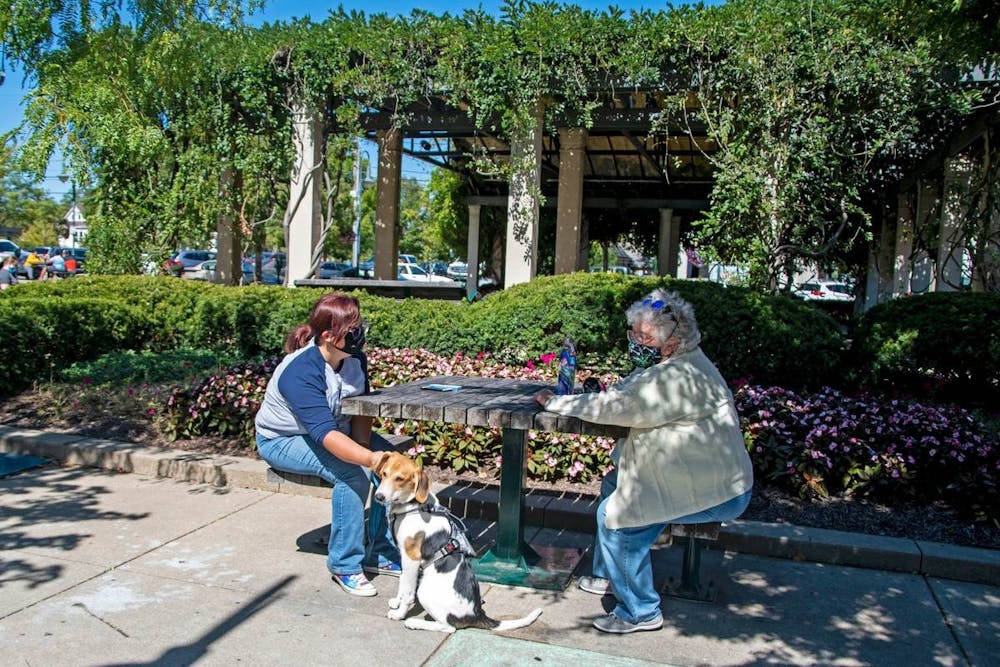Permanent Oxford residents have mixed feelings about Miami University’s decision to continue with its phased return to campus, bringing even more students into Oxford.
For some Oxford residents, this decision is a matter of life and death – with the university already reporting more than 1,350 cumulative positive COVID-19 tests among students since classes started in mid-August.
Oxford’s Assistant City Manager Jessica Greene said the decision to return was not made without discussion between the city and the university, specifically the university’s Safe Return to Campus Planning and Coordinating Committee.
“I’ve been meeting weekly with Miami University for months – twice a week, actually, for most of the spring and summer,” Greene said. “We really spoke through all the scenarios and what they would mean for our community’s health; what they would mean for our community’s economics; what they would mean as far as perception and fear.”
Economic Impact
Many permanent residents – both members of the government and other members of the community – recognize the economic importance of students returning to campus.
Kelli Riggs, president of the Oxford Chamber of Commerce, cited the importance of students in the economic activity of the town.
“Living in a college town and having small businesses in college towns, those businesses really rely on a lot of extra foot traffic in order to have their businesses thrive more during the school year,” Riggs said.
One of these businesses, Bagel and Deli, spoke to the direct impact of this extra foot traffic.
“Over the summers and winters, a typical day will yield, at best, $1,000. During non-quarantine time during the school year a day will yield upwards of $5,000 to $10,000,” manager Alex Bauman said.
Amy Schlake, a retail worker at The Apple Tree boutique uptown, also said the store relies on students.
“We definitely need that business [from the students and parents]. But we were also concerned about our health and being around customers, as well as our customers’ health,” Schlake said.
Enjoy what you're reading?
Signup for our newsletter
Even businesses that have very limited interactions with the student population recognize the economic benefits of having students in town.
James Robinson, an attorney with Robinson & Jones, said his firm represents a Miami student only once or twice a month, and it sees no major decrease in cases during the times that students are not in Oxford.
But he predicted his firm would begin to feel the impact of students’ absence from Oxford within a year if students did not return.
“If students were gone for a year, that would cause many businesses to close up and maybe move away, in which case that will affect us if our client base was no longer here,” Robinson said.
Riggs mentioned that one or two businesses had earlier expressed concern about remaining open if students didn’t return.
But Vice Mayor Bill Snavely said he had also heard several businesses claim they didn’t want students to return because they could operate entirely from the permanent residents and off-campus students.
Ultimately, the City of Oxford is largely dependent on the university, even outside of the students. As Greene said, the tax money generated from the university supports critical infrastructure.
“If there were no students, there would be no Oxford,” Snavely said.
Social Impact
Although Miaimi students have a profound effect on Oxford’s economy, many permanent residents expressed concern at the quickly rising number of coronavirus cases in Oxford.
“I’m worried that I could get it and either get irreversible brain damage or die,” Bauman said. “And I’m worried about that every day. I understand that money is important to the economy, and everyone at the school is important, but they’re risking infecting so many more people.”
In light of the positive cases, concern is growing.
“For me personally, and I think for most of the people in town, the level of concern is large,” Snavely said.
Snavely said he is personally choosing to decrease in-person dining and is shopping mostly online in an attempt to minimize contact with those infected.
Greene stressed the importance of public safety in the eyes of both the city and the university during the entirety of the planning process.
“Public health is as important – more important,” Greene said. “We very much want to take this seriously and treat this with responsibility, which is why the City of Oxford has taken a lot of really progressive precautions that other communities are not taking.”
Even with these precautions, such as the mass gathering ban and face covering ordinance, public opinion is divided.
Reactions to the university’s decision range from “extreme anger” to “support” to a more “mixed reaction.” But almost everyone interviewed agreed it’s now up to the student body to take responsibility for the community that will serve as their home for the next several months.
“The main concerns [moving forward] are that Miami students have the same concerns that year-round residents have,” Snavely said. “We want Miami to continue, we want you to have in-person classes … It’s in everyone’s interest to follow these rules.”




